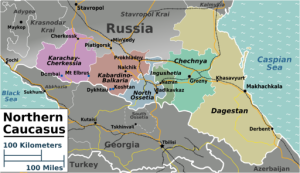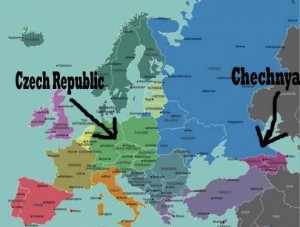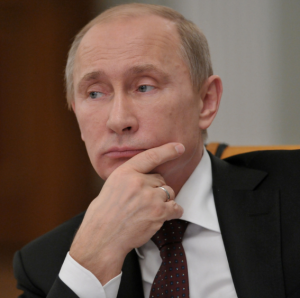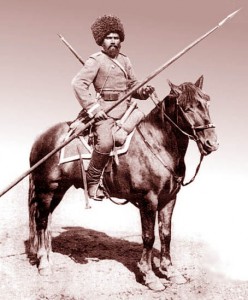 The only official language in the Russian Federation is Russian and I would suspect that most Americans would think of Russia as a monolingual country, similar to the way many Americans see the U.S., despite the dramatic demographic changes in the U.S. that have made it multilingual in many locations. The reality about Russia’s language situation is quite different, as I have been experiencing in a visit to Pyatigorsk, located in the North Caucasus, in Southern Russia, between the Black Sea and the Caspian Sea. I am here to establish a partnership between my university, VCU, and Pyatigorsk State Linguistic University (PSLU). As you walk down the street or ride the street car here, you hear almost exclusively Russian. But go into a local eatery or bar, especially one specializing in local cuisine, such as Ossetian pies (kind of like stuffed pizzas) or Schashlik (kebabs), and you’re likely to see groups sitting together speaking one of the 30 to 40 indigenous languages of the North Caucusus. These include the Dagestanian language family, represented in the Northeast and a variety of languages, including Abkhaz, Abaza, Circassian, and Adyghe, in the Northwest. The language diversity is extraordinary, considering the small territory in question (see map above). The diversity continues south of the Caucasus. Georgia’s last census (2002) counted over 120 languages. The three major peoples in South Caucasia – the Georgians, Armenians and Azerbaijanis, all speak different languages that are mutually unintelligible.
The only official language in the Russian Federation is Russian and I would suspect that most Americans would think of Russia as a monolingual country, similar to the way many Americans see the U.S., despite the dramatic demographic changes in the U.S. that have made it multilingual in many locations. The reality about Russia’s language situation is quite different, as I have been experiencing in a visit to Pyatigorsk, located in the North Caucasus, in Southern Russia, between the Black Sea and the Caspian Sea. I am here to establish a partnership between my university, VCU, and Pyatigorsk State Linguistic University (PSLU). As you walk down the street or ride the street car here, you hear almost exclusively Russian. But go into a local eatery or bar, especially one specializing in local cuisine, such as Ossetian pies (kind of like stuffed pizzas) or Schashlik (kebabs), and you’re likely to see groups sitting together speaking one of the 30 to 40 indigenous languages of the North Caucusus. These include the Dagestanian language family, represented in the Northeast and a variety of languages, including Abkhaz, Abaza, Circassian, and Adyghe, in the Northwest. The language diversity is extraordinary, considering the small territory in question (see map above). The diversity continues south of the Caucasus. Georgia’s last census (2002) counted over 120 languages. The three major peoples in South Caucasia – the Georgians, Armenians and Azerbaijanis, all speak different languages that are mutually unintelligible.
At the end of a meeting I had this afternoon with students at PSLU, students having a native language other than Russian were asked to raise their hands. Out of a group of perhaps 40 students, 6 or 7 indicated that, although they were all native-born Russian citizens, they did not speak Russian as their first language. In talking to PSLU professors after my meeting with students, they acknowledged that there is considerable linguistic and cultural diversity among their students, who are mostly drawn from the North Caucasus region. All three professors were themselves ethnic Russian, but indicated that they felt distinct from ethnic Russians in the North and, in fact, were treated differently when they traveled to St. Petersburg or Moscow. They jokingly spoke of having been effected by the regional culture here, becoming more vivacious and emotional, as they claimed was typically of the inhabitants of the region.
It’s been wonderful to see Russia in a positive light, given the political tension currently between our countries. As an individual American I have had nothing but positive experiences here, having been warmly welcomed at the university and elsewhere. It’s also been nice to see a different side of a region that we hear about only in terms of conflict and terrorism, with Chechnya nearby.



